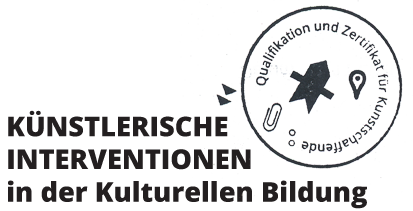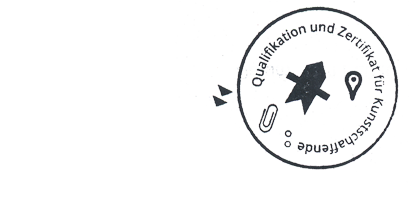


The Potential of the Arts in Education
The arts are regarded as essential to learning and education. The first module examines the reasons for this and the extent to which artistic processes can facilitate self-educational processes. In reflecting on art and cultural education, each participant’s artistic approach will be taken into account. Here, one’s own artistic stance and interests are to serve as starting points for cultural education processes. Artistic research aspects will also be discussed. Additionally, the training will introduce fundamental concepts for developing your own practice-based project during the course.
Central questions
What are the benefits if I incorporate cultural education into my own artistic practice?
Is quality a matter of teaching methodology or approach and how can quality criteria be developed for artistic-based work with laypeople? Which concepts from the overall field of cultural education and outreach are useful for contextualizing one’s own practice?
Which international perspectives on artistic work in cultural education can offer ideas for one’s own practice?
Theoretical Concepts and Discourse
This module will focus on the theoretical concepts and discourse of art and cultural education as well as cultural education from the interdisciplinary perspective of diversity. An examination of international discourse will serve as an important basis here. This will be accompanied by an analysis of significant approaches to cultural and educational policy.
Central questions
Which theoretical approaches and discourses are formative and inspiring for artistic-based work in cultural education?
What level of participation is attainable in artistic-based work with social groups?
To what extent are diversity concepts needed for artistic-based work with social groups in order to achieve participatory equity? Are there educational concepts that can be applied equally to all social groups?
How can artistic projects help mobilize students to participate in lasting ways?Theoretical Concepts and Discourse
This module will focus on the theoretical concepts and discourse of art and cultural education as well as cultural education from the interdisciplinary perspective of diversity. An examination of international discourse will serve as an important basis here. This will be accompanied by an analysis of significant approaches to cultural and educational policy.
Central questions
Which theoretical approaches and discourses are formative and inspiring for artistic-based work in cultural education?
What level of participation is attainable in artistic-based work with social groups?
To what extent are diversity concepts needed for artistic-based work with social groups in order to achieve participatory equity? Are there educational concepts that can be applied equally to all social groups?
How can artistic projects help mobilize students to participate in lasting ways?
Strategies and Practice-based Formats for Art and Cultural Education
Methods and approaches to teaching cultural education and artistic-based projects are the focus of this module. Examined will be the challenges of cultural educational projects in both rural areas as well as digital space. Practice-based cultural education methods and formats from various disciplines—theater education, dance education, art education and museum education, music education and concert education, film education, literature education and media education—will be presented and analyzed together for their potential relevance for aesthetic cultural education. It will then be examined how the respective contexts and participants can impact or influence educational processes and how to take these aspects into account.
Central questions
Which cultural education methods are used with the various disciplines? How do the various disciplines differ from one another?
What are the differences in working with different age groups? What are the differences between urban and rural areas?
In what ways can digital processes enrich forms of cultural education work?
How can your own concepts of working artistically be translated into formats for working with groups?
How can overarching artistic methods and insights from the history of art and knowledge inspire new formats in cultural education?
Strategies and Practice-based Formats for Art and Cultural Education
Methods and approaches to teaching cultural education and artistic-based projects are the focus of this module. Examined will be the challenges of cultural educational projects in both rural areas as well as digital space. Practice-based cultural education methods and formats from various disciplines—theater education, dance education, art education and museum education, music education and concert education, film education, literature education and media education—will be presented and analyzed together for their potential relevance for aesthetic cultural education. It will then be examined how the respective contexts and participants can impact or influence educational processes and how to take these aspects into account.
Central questions
Which cultural education methods are used with the various disciplines? How do the various disciplines differ from one another?
What are the differences in working with different age groups? What are the differences between urban and rural areas?
In what ways can digital processes enrich forms of cultural education work?
How can your own concepts of working artistically be translated into formats for working with groups?
How can overarching artistic methods and insights from the history of art and knowledge inspire new formats in cultural education?
Cultural Education in School Contexts
What makes school a locus of culture? This module will analyze the living environments of children and teens as well as the defining features of schools. Starting from an examination of their own school experiences, participants will reflect on the role of arts practitioners as external project members as well as the question to what extent can one’s own practice within art projects be used to effect change in “school.” This module focuses specifically on how to create effective partnerships under systemic school conditions.
Central questions
How do your own school experiences shape your view of the potential usefulness of cultural education in schools?
What possibilities does the school context offer for one’s own artistic research?
What added benefit does artistic work offer the school system?
What must be understood about the basic operating parameters of schools in order to work in school contexts effectively?
How can arts practitioners choreograph how students interact with them, one another and with art?Cultural Education in School Contexts
What makes school a locus of culture? This module will analyze the living environments of children and teens as well as the defining features of schools. Starting from an examination of their own school experiences, participants will reflect on the role of arts practitioners as external project members as well as the question to what extent can one’s own practice within art projects be used to effect change in “school.” This module focuses specifically on how to create effective partnerships under systemic school conditions.
Central questions
How do your own school experiences shape your view of the potential usefulness of cultural education in schools?
What possibilities does the school context offer for one’s own artistic research?
What added benefit does artistic work offer the school system?
What must be understood about the basic operating parameters of schools in order to work in school contexts effectively?
How can arts practitioners choreograph how students interact with them, one another and with art?
Cultural Management for Arts Practitioners in Cultural Education
When arts practitioners undertake cooperative formats in cultural education and mediation work, they consistently have to negotiate the underlying conditions of often unfamiliar systems. This module examines cultural-management strategies and methods for approaching project management, financing, marketing, PR and audience development in the area of arts- and culture-based project work.
Central questions
How do I effectively position my artistic and cultural work with relevant stakeholders?
Which management tools and knowledge of formal parameters are indispensable for the success of a project and cultural education work as an artist? How can management be understood as a design task?
How can tasks such as PR, writing proposals or developing project plans be used for one’s own artistic work?
Cultural Institutions as Places of Learning
This module examines the conditions, aims, concepts and formats of art and cultural education in cultural institutions such as museums, theaters and concert halls. How can arts practitioners effectively contribute to often inflexible and hierarchical institutions while utilizing existing infrastructures and resources? How can they help ensure that cultural education and mediation projects become the engine for institutional transformation processes that facilitate greater diversity?
Central questions
How do I effectively position my artistic and cultural work with relevant stakeholders?
Which management tools and knowledge of formal parameters are indispensable for the success of a project and cultural education work as an artist? How can management be understood as a design task?
How can tasks such as PR, writing proposals or developing project plans be used for one’s own artistic work?
Hand’s-on Training
This module guides fellows during their practice-based projects. The focus of the collaborative work ranges from concept development and implementation, to reflecting on and evaluating the projects, to professional documentation.
Central questions
How can the insights and new aesthetic experiences gained in the course be used as examples/models when implementing cultural education projects against the background of one’s own artistic practice? What basic conditions are necessary in order to provide criteria-based, qualified feedback on cultural education projects?
Train-the-Trainer Module
This immersive, train-the-trainer module provides participants the basics for teaching the skills learned during the certification course as a lecturer. Critical teaching concepts will be tested based on devising and implementing qualified training modules for teachers or arts practitioners.
Central questions
How can I reliably and effectively convey the insights and experiences I’ve gained to other artists?
How can this knowledge transfer be effectuated independently of a particular artist’s personality?Train-the-Trainer Module
This immersive, train-the-trainer module provides participants the basics for teaching the skills learned during the certification course as a lecturer. Critical teaching concepts will be tested based on devising and implementing qualified training modules for teachers or arts practitioners.
Central questions
How can I reliably and effectively convey the insights and experiences I’ve gained to other artists?
How can this knowledge transfer be effectuated independently of a particular artist’s personality?
Immersion Units for Various Artistic Disciplines
As part of the certification course, experts from the Art Labs and the Bundesverband Kulturagent*innen für kreative Schulen e. V. (BVKA) have developed immersion units for various artistic disciplines. Here module topics are supplemented by more in-depth course units in the fields of visual arts, literature, music, theater, contemporary dance and school collaborations. Participating arts practitioners will be able to develop their own cultural education strategies based on their specific artistic practice in direct consultation with highly seasoned, nationally recognized specialists.
Within the framework of Modules 3 (Strategies and Practice-based Formats for Art and Cultural Education), 4 (Cultural Education in School Contexts), 5 (Cultural Institutions as Places of Learning) and 7 (Hand’s-on Training), approximately five hours of immersion units will be offered at the Bundesakademie für Kulturelle Bildung Wolfenbüttel. Upon completing the above-listed modules with the entire group, fellows can then select a specific module topic in an area of their choice (visual arts, literature, music, theater, contemporary dance and school collaborations) for more in-depth study in a small team of maximum six participants.
For the above-listed areas of visual arts, literature, music, theater, contemporary dance and school collaborations, two additional immersion units are offered on site in the respective project-partner setting for a maximum of six participants each. This enables fellows to exchange ideas directly with one another in small groups in the actual work environments of the project partners. Knowledge transfer therefore evolves within the particular setting in conjunction with the professional expertise and experience of project partners. At the same time, participants make new contacts and are able to tap into new networks.